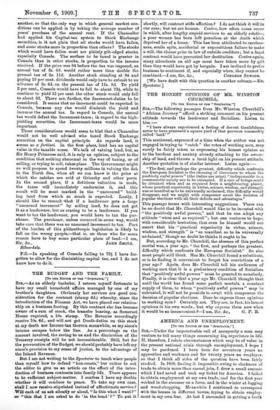THE BUDGET AND THE FAMILY.
[To THE EDITOE 01 THE " SPECTAT013.1
SIR,—As an elderly bachelor, I esteem myself fortunate to have my small household affairs managed by one of my brother's daughters. Obviously her services are good con- sideration for the contract (stamp 6d.) whereby, since the introduction of the Finance Act, we have placed our relation- ship on a business footing. By this contract she has become owner of a sum of stock, the transfer bearing, as Somerset House required, a 10s. stamp. The Revenue accordingly receive 10s. 6d., and will not get Death-duties on this stock at my death nor Income-tax thereon meanwhile, as my niece's income escapes below the line. As a percentage on the amount involved, the saving to us and the diminution of the Treasury receipts will be not inconsiderable. Still, but for the provocation of the Budget, we should probably have left my niece's provision to my sense of justice, to the advantage of the Inland Revenue.
But I am not writing to the Spectator to teach wiser people than myself how to defend "hen-roosts," but rather to ask the editor to give us an article on the effect of the intro- duction of business contracts into family life. There appears to be sufficient subject-matter. I confess I have my doubts .whether it will conduce to peaee. To take my own case, shall I now receive stipulated instead of affectionate service ? Will each of us ask silently or aloud, "Is this what I want?" -or "this that Jam asked to do 'in the bond' ? " To put it shortly, will contract stifle affection ? I do not think it will in our case; but we are human. Contra, how often cases occur in which, after lengthy unpaid services to an elderly relative, a poor woman has been left penniless at the death which deprived her of a home. This has been attributed to careless- ness, senile spite, accidental or superstitions failure to make a will, the claims prior in law of outside creditors ; but a legal contract would bare prevented her destitution. Contra again, many attendants on old age must have taken more by gift than they would have got by bargain. I am inclined to prefer business to sentiment if, and especially when, they cannot be combined.—I am, Sir, &c., COELEBS SENIOR. [We have dealt with this question in another column.—En, Spectator.]






























































 Previous page
Previous page